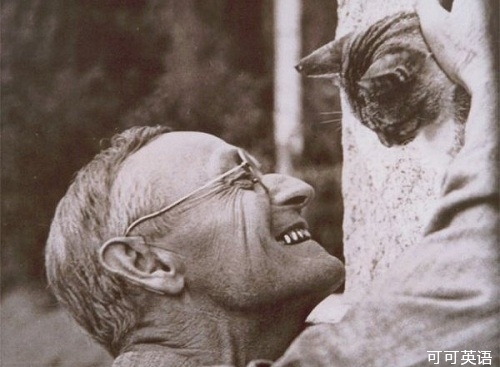(单词翻译:单击)
名著阅读
Quoth Siddhartha: "Always, oh Govinda, I had thought, Govinda would stay with the Samanas, always I had believed his goal was to live to be sixty and seventy years of age and to keep on practising those feats and exercises, which are becoming a Samana. But behold, I had not known Govinda well enough, I knew little of his heart. So now you, my faithful friend, want to take a new path and go there, where the Buddha spreads his teachings."
Quoth Govinda: "You're mocking me. Mock me if you like, Siddhartha! But have you not also developed a desire, an eagerness, to hear these teachings? And have you not at one time said to me, you would not walk the path of the Samanas for much longer?"
At this, Siddhartha laughed in his very own manner, in which his voice assumed a touch of sadness and a touch of mockery, and said: "Well, Govinda, you've spoken well, you've remembered correctly. If you only remembered the other thing as well, you've heard from me, which is that I have grown distrustful and tired against teachings and learning, and that my faith in words, which are brought to us by teachers, is small. But let's do it, my dear, I am willing to listen to these teachings--though in my heart I believe that we've already tasted the best fruit of these teachings."
Quoth Govinda: "Your willingness delights my heart. But tell me, how should this be possible? How should the Gotama's teachings, even before we have heard them, have already revealed their best fruit to us?"
Quoth Siddhartha: "Let us eat this fruit and wait for the rest, oh Govinda! But this fruit, which we already now received thanks to the Gotama, consisted in him calling us away from the Samanas! Whether he has also other and better things to give us, oh friend, let us await with calm hearts."
On this very same day, Siddhartha informed the oldest one of the Samanas of his decision, that he wanted to leave him. He informed the oldest one with all the courtesy and modesty becoming to a younger one and a student. But the Samana became angry, because the two young men wanted to leave him, and talked loudly and used crude swearwords.
Govinda was startled and became embarrassed. But Siddhartha put his mouth close to Govinda's ear and whispered to him: "Now, I want to show the old man that I've learned something from him."
Positioning himself closely in front of the Samana, with a concentrated soul, he captured the old man's glance with his glances, deprived him of his power, made him mute, took away his free will, subdued him under his own will, commanded him, to do silently, whatever he demanded him to do. The old man became mute, his eyes became motionless, his will was paralysed, his arms were hanging down; without power, he had fallen victim to Siddhartha's spell. But Siddhartha's thoughts brought the Samana under their control, he had to carry out, what they commanded. And thus, the old man made several bows, performed gestures of blessing, spoke stammeringly a godly wish for a good journey. And the young men returned the bows with thanks, returned the wish, went on their way with salutations.
On the way, Govinda said: "Oh Siddhartha, you have learned more from the Samanas than I knew. It is hard, it is very hard to cast a spell on an old Samana. Truly, if you had stayed there, you would soon have learned to walk on water."
"I do not seek to walk on water," said Siddhartha. "Let old Samanas be content with such feats!"
席特哈尔塔说:“哦,戈文达,我一直以为戈文达会留在沙门这儿,一直以为戈文达的目标是活到六十岁和七十岁,继续从事那些为沙门装点门面的技巧和修行呢。可是你看,我对戈文达了解得太少,我对他的心知道得太少。朋友,如今你也想另选一条路,去活佛那儿聆听他的教诲了!”
戈文达说:“你可真爱讽刺人。那就随你讽刺吧,席特哈尔塔!不过,你心中不是也有一种要求,一种兴趣,想去聆听这种教诲么?你以前不是跟我说过,这样沙门之路不会再长久走下去了么?”
席特哈尔塔以他特有的方式笑了,语气里带着一丝悲哀和嘲讽,说道:“不错,戈文达,你说得对,你记性真好。但愿你也记得你从我这儿听到的其他话,那就是我对学说和学习已经怀疑和厌倦了,我对老师们灌输给我们的那些话也缺乏信仰了。好吧,亲爱的,我已经准备好了去听那种教诲——尽管我心里确信,我们已经尝过了那种教诲的甜美果实。”
戈文达说:“你的决心真叫我高兴。可是你倒说说看,这怎么会可能呢?在聆听戈塔马的教诲之前,咱们怎么可能已经尝到了它的甜美果实呢?”
席特哈尔塔说:“哦,戈文达,咱们还是去细细品味这果实,继续耐心静候吧!咱们现在就该感谢戈塔马,因为这果实就在于他促使我们脱离了沙门!至于他是否还会给予我们别的更好的东西,朋友,咱们就耐心静候吧。”
就在同一天,席特哈尔塔把他的决定告诉了那个老沙门,表示要离开他。他说话的态度谦逊有礼,合乎晚辈与弟子的规矩,可是,老沙门却对两个年轻人要离开他大为光火,高声大叫,并且使用了粗野的骂人话。
戈文达吓坏了,不知所措。而席特哈尔塔却把嘴凑到戈文达耳边,低语道:“现在我要让这个老头儿看看,我在他这儿到底学到了什么?”
他凑到老沙门面前,聚精会神,直视老人的目光,用法术蛊惑他,使他出不得声,没了主见,屈服于徒弟的意志,不声不响地去做要求他做的事情。老人果然不出声了,眼神呆滞,意志瘫痪,胳臂也耷拉下来,无力对付席特哈尔塔的法术;而席特哈尔塔的思想却控制了老沙门,使他不得不执行给他下的命令。于是,老人连连鞠躬,并且作出祝福的手势,结结巴巴地说着“一路顺风”之类的祝愿。两个年轻人也鞠躬致谢,答以祝愿,然后有礼貌地离去了。
半路上,戈文达说:“哦,席特哈尔塔,你从沙门那儿学到的东西可比我所了解的多。要想蛊惑一个老沙门是困难的,十分困难。真的,要是你还留在那儿,你很快就能学会在水面上自由行走!”
“我才不要求能在水面上行走呢。”席特哈尔塔说,“让那些老沙门去为这样的本领而沾沾自喜吧!”
背景阅读

本书简介:
古印度贵族青年悉达多英俊聪慧,拥有人们羡慕的一切。为了追求心灵的安宁,他孤身一人展开了求道之旅。他在舍卫城聆听佛陀乔答摩宣讲教义,在繁华的大城中结识了名妓伽摩拉,并成为一名富商。心灵与肉体的享受达到顶峰,却让他对自己厌倦、鄙弃到极点。在与伽摩拉最后一次欢爱之后,他抛弃了自己所有世俗的一切,来到那河边,想结束自己的生命。在那最绝望的一刹那,他突然听到了生命之河永恒的声音……经过几乎一生的追求,悉达多终于体验到万事万物的圆融统一,所有生命的不可摧毁的本性,并最终将自我融入了瞬间的永恒之中。
作者简介:
赫尔曼·黑塞(Hermann Hesse,1877.7.2-1962.8.9)德国作家。1923年46岁入瑞士籍。1946年获诺贝尔文学奖。1962年于瑞士家中去世。爱好音乐与绘画,是一位漂泊、孤独、隐逸的诗人。黑塞的诗有很多充满了浪漫气息,从他的最初诗集《浪漫之歌》的书名,也可以看出他深受德国浪漫主义诗人的影响,以致后来被人称为“德国浪漫派最后的一个骑士”。主要作品有《彼得·卡门青》、《荒原狼》、《东方之行》、《玻璃球游戏》等。
主要生平及创作
出生于德国西南部的小城卡尔夫的一个牧师家庭。自幼在浓重的宗教气氛中长大,1891年,他通过“邦试”,考入毛尔布隆神学校。由于不堪忍受经院教育的摧残,半年后逃离学校。这期间他游历许多城市,从事过多种职业。
在比较广泛地接受东西方文化熏陶之后,1904年,黑塞发表了长篇小说《彼得·卡门青特》,一举成名,从此成为专业作家。这一年他与玛丽结婚,移居巴登湖畔,埋头写作,1906年发表了长篇小说《在轮下》。这一时期的创作以浪漫主义诗歌、田园诗风格的抒情小说和流浪汉小说为主,作品洋溢着对童年和乡土的思念之情,充满对广大自然和人类的爱,同时也表现了青年人的精神苦闷与追求。
第一次世界大战后,黑塞的创作发生了明显的变化,他醉心于尼采哲学,求助于印度佛教和中国的老庄哲学,并对荣格的精神分析产生了深厚的兴趣。他试图从宗教、哲学和心理学方面探索人类精神解放的途径。这时期的长篇小说有《克努尔普》(1916)、《德米安》(1919)、《席特哈尔塔》(1922)、《荒原狼》(1927)和《纳尔齐斯与歌尔德蒙》(1930)等。这些书深受西方读者的喜爱,得到极高的评价,其中《荒原狼》曾轰动欧美,被托马斯·曼誉为德国的《尤利西斯》。
30年代后,法西斯在德国猖獗,黑塞对社会前途陷入深深的怀疑与绝望之中,但他仍不倦地从东西方宗教与哲学中寻求理想世界,《东方之行》(1932)、《玻璃球游戏》(1943)正是这一时期追求与探索的结晶。
黑塞被雨果·巴尔称为德国浪漫派最后一位骑士,这说明他在艺术上深受浪漫主义诗歌的影响。他热爱大自然,厌倦都市文明,作品多采用象征手法,文笔优美细腻;由于受精神分析影响,他的作品着重在精神领域里进行挖掘探索,无畏而诚实地剖析内心,因此他的小说具有心理的深度。1946年,"由于他的富于灵感的作品具有遒劲的气势和洞察力,也为崇高的人道主义理想和高尚风格提供一个范例",黑塞获诺贝尔文学奖。


